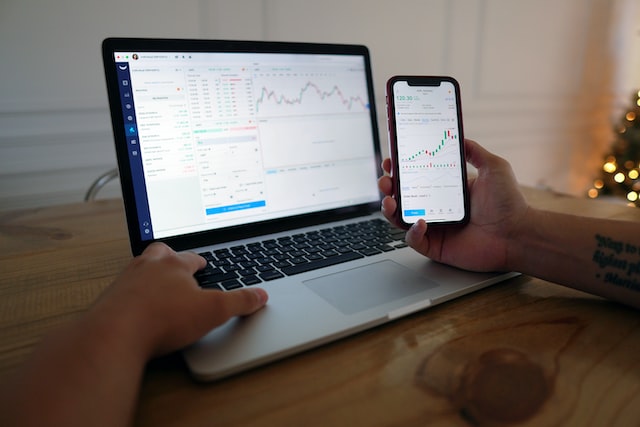The foreign exchange market is widely considered the largest financial market in the world. One of the ways a new or small investor might make a fortune in trading with the minimum initial capital is through forex. How much money do forex traders make, though?
What Do Forex Traders Earn?
10% of retail forex traders (who professionally trade forex, while 90% lose money) can make between $500 and $5,000 per month in salary, whereas professional forex traders in large businesses can make an average of $6600 per month. Proprietary company traders can make up to $10,000 per month. The fund size, profit-sharing ratio, commission, and bonuses affect how much money traders make each month in businesses. Learn more about how forex trading works in this article, as well as about FX & CFD brokers accepting Perfect Money deposits. We also outline the typical annual salary of a forex trading expert.
Supply and demand principles govern the FX market. In other words, a currency’s value rises in response to demand and falls in response to a decrease in demand. The optimal time to buy and sell currencies is when they are at their lowest value. It could be required to short-sell assets if a trader is in a downward trend when trading, which entails borrowing, selling, buying back, and returning the borrowed item. In this scenario, the trader profits if the asset price increases during the sale and decreases during the purchase. Keep in mind that trading on luck alone might result in significant losses. Understanding how the currency market operates is crucial.
What distinguishes experienced Forex Traders from Novices?
In the world of forex, new traders are still like students; occasionally, they will trade based on luck and forecast. Beginner traders utilize technical indicators, data analysis, and market analysis to assist themselves and obtain the technical analysis. Professional traders make decisions based on what they see rather than luck. They can compare and corroborate the charts produced by their technical analysis using fundamental research rather than spending most of their time analyzing the market.
Investing in a Hedge Fund
A basic wage is paid to forex traders who work or trade for a business. Additionally, it includes bonuses based on productivity. There are strategy and software resources available when trading for a hedge fund. The software tools are incredibly efficient at providing traders with important and valuable information fast, but because of their efficiency and speed, they are not inexpensive.
These traders can also access comprehensive mentoring and training programs to pick the brains of experienced traders. Another interesting thing to consider is that a trader may receive larger performance bonuses and higher pay when the trader generates significant revenue for the business. However, a minor drawback of working for a hedge fund is that one can have long work hours and extremely demanding clients, and if corporate targets are not fulfilled, one risks losing their job.
Self-Employed Traders
Some forex traders, either by need or desire, prefer to operate for themselves. Working for yourself has several benefits, like the freedom to choose your hours and keep all your earnings, which is different from working for an employer who will only give you a portion of the money made. Working alone has the drawback of no base pay, and you could become irritated when money is risked and lost, especially if you have no other sources of income. Additionally, purchasing trading software may be fairly pricey. Independent traders could rely on news, online updates, or paid data feeds.
How Much Do Professional Forex Traders Earn?
The following are some of the factors that affect a professional forex trader’s earnings:
- Fund Size
- Profit Percentage
- Tenure
- Business Type
- Performance
- Location

Let’s talk about a few things. The most important factor is fund size because you cannot handle $10 000 and $10 million for the same profit.
1.Seniority
There are positions like analysts, junior traders, and senior traders when working for a hedge fund. The majority of traders employed by the hedge fund organization probably started as analysts. The analyst’s main responsibility is to assist new and experienced traders. Based on merit and competence, the analyst is promoted to a junior trader after a while. Junior traders could make between $300,000 and $3,000,000 annually on average (including bonuses and commission). Senior traders may earn up to $10 million annually (including bonuses and commissions). However, depending on performance, the numbers could go up or down.
2.Trading Company
According to estimates from Glassdoor, a trader in the US may make an average annual salary of $100,000. Given the wide range in salaries and bonuses between businesses, this sum represents the average. Examples are J.P. Morgan traders, who receive an average base income of $95,995, and Goldman Sachs traders, who earn an average base compensation of $120,024. Traders at Citibank make $158,166 per year, while those at HSBC make $197,029 per year. (Please note that the values do not include commissions or bonuses; they are just salary.)
3.Location
The location has a significant impact on a forex trader’s income. Examples include the disparities in pay between Citibank traders in different locations, such as the UK and the US. One trader works for Citibank UK and earns 58,951 pounds, whereas the other trader is employed by Citibank USA and makes $149,156. The same is true of the Gold Sachs bank, where a trader in the UK can earn around 79,971 pounds while earning $129,578 in the US. (Remember that the amounts are salary only and do not account for commissions or bonuses).
Conclusion
It can be very challenging to get at a firm estimate of what a forex trader might earn. Location, seniority, and the company a trader works for are all aspects of being a company trader that impact income. Earnings for independent traders depend on their starting balance and periodic profits. Furthermore, each trader is different, and no trader earns the same amount of money.
